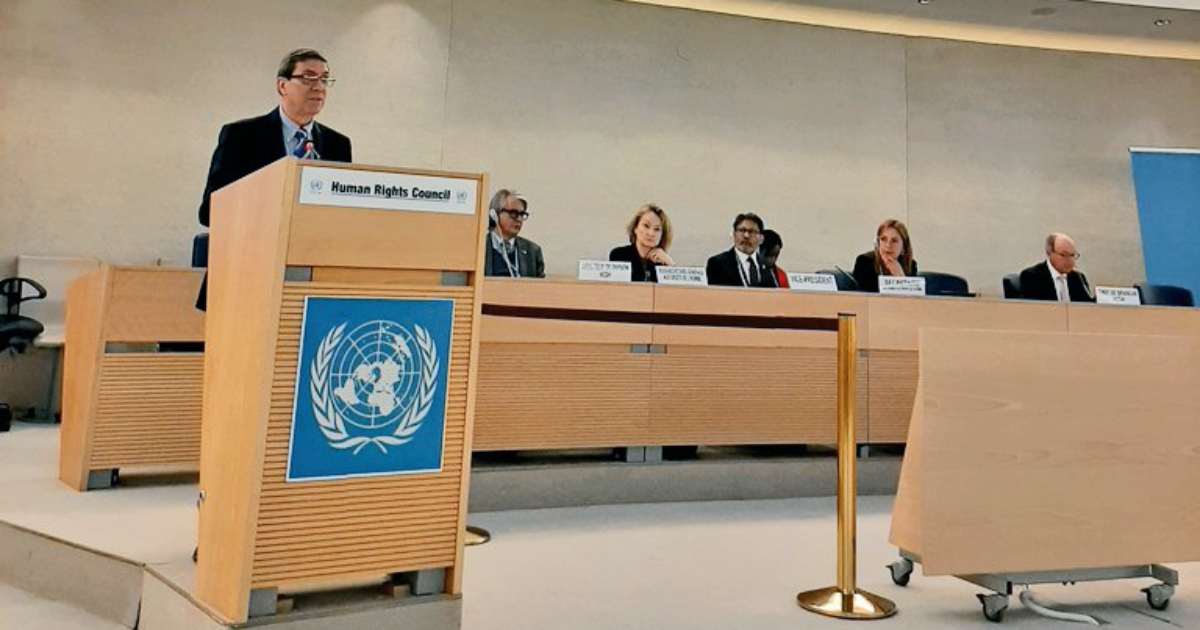
The Cuban regime blamed the United States forinflation and low wages in Cuba, once again using the “blockade” argument to justify its inability to unlock the country's productive forces, open to the market and generate wealth and prosperity for its citizens.
This was expressed by the Minister of Foreign Affairs of Cuba,Bruno Rodriguez Grill, in aspeech delivered during the high-level segments of the 52nd session of the Human Rights Council, held this Tuesday in Geneva.
“The US government applies a genocidal policy of blockade, intensified to the extreme and of 'maximum pressure', which has subjected the Cuban economy to extraordinary tensions that impact the deterioration of consumption and the standard of living of families, inflation , prices, salaries…” said the Cuban foreign minister.
With inflation of 34.2 percent annually –According to data from the Economic Commission for Latin America and the Caribbean (ECLAC), Cuba is located behind Venezuela (146%) and Argentina (87.8%) in the list of countries in the region according to their inflation rates in 2022.
Interviewed at the end of the year byCyberCuba, the EconomistElijah Love indicated that inflation is a monetary phenomenon that has its origins in 2020with the uncontrolled expansion of spending and public deficit, aggravated by the“economic and monetary order” undertaken by the Cuban regime in 2021.
Quoting the Minister of Economy and Planning,Alejandro Gil Fernandez, the analyst highlighted the explanations offered by the Cuban government to citizens in relation to the inflation that hits their pockets.
In the X Ordinary Period of Sessions of the IX Legislature of the National Assembly of People's Power, held in mid-December, Minister Gil maintained thatThe problem of inflation in Cuba is a combined effect of a series of causes, which range from “the lack of availability of foreign currency, the decrease in production plans, the supply deficit and indiscipline associated with the diversion of resources, speculation, resale and illicit enrichment.”
Furthermore, he assured, “there is imported inflation, due to prices in the world market.” This “induced inflation” occurs because the country imports more expensive goods than before. “We are importing that inflation into the country by paying more for what we bring… therefore, we cannot fight that inflation.”
As it could not be otherwise, he also included the “blockade” among the factors that affect inflation in Cuba, but mentioned another series of economic variables unrelated to US policy towards Cuba and dependent on the management of the executive ofMiguel Diaz-Canel.
For Amor, in 2023 Cubans will be even poorer because the regime is incapable of facilitating economic recovery and its plan for 2023 recognizes that failure.The price of a liter of oil edible at the end of February (1,500 pesos in the informal market),or the pound of rice (250 CUP), they seem to agree.
However, for the Cuban Foreign Minister, the US “blockade” is responsible for the shortage of food and medicine.
The data that indicates that in 2022 is not valid for Rodríguez ParrillaCuba acquired food and agricultural products from the United States worth $328.5 million dollars, a figure that constitutes the largest increase in the Cuban government's operations in the US market in the last decade. Nor the repeated precision of the US government indicating thatThe embargo does not affect the purchase of medicines.
It is the “blockade”, as he said in Geneva, that is responsible for the collapse of the National Electrical System and the unbearableblackouts, as if other countries allied to Cuba could not provide the necessary supplies for its recovery.
It is the “blockade” that “hits the country's income, financial transactions, industry, construction, services, trade, investment, health and education.”
Conclusions from Rodríguez Parrilla: without the “blockade”, the Cuban regime (the same one that applies a policy of strangulation and subjugation of private initiative, the one that does not release the productive forces of the country, does not fulfill its financial obligations, has destroyed the industry sugar industry, has recklessly and opaquely invested huge sums of the national budget in tourism; the same one that promotes the largest migratory exodus from Cuba to alleviate internal pressure), without a “blockade”, it would be prosperous and would distribute wealth equitably.
Gil, Díaz-Canel and company can sleep peacefully. Bruno is there to justify his actions in favor of the extractive elites of the Cuban regime, including therepression intensified onindependent civil society that peacefully demands a change, and that -afterthe historic 11J protests in Cuba-, he only found the answer"battle array" of the Palace of the Revolution.
What do you think?
SEE COMMENTS (1)Filed in: